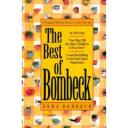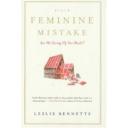Leslie Feinberg, a brilliant thinker and writer who’s the embodiment of gender fluidity, once said that if someone from another planet were to research us via our popular magazines, s/he’d conclude that being a female Earthling is a skill to be mastered, not a gender to be experienced. From Women’s Day to Cosmopolitan to Ms to BITCH, the articles in magazines aimed at women are primarily instructional. They used to teach us just one thing: how to be superb housewives and mothers; in the name of liberation they’ve expanded their repertoire, and now also teach us how to eat, dress, bar-hop, invest in stocks, get promoted, make new friends and give better blow jobs. The women’s magazines are nothing if not adaptable—but always within the same philosophical framework.



This weekend I read, by pure coincidence, an interesting juxtaposition of articles: Mom’s The Word, by J.L. Scott, The Lives of Others, by Rebecca Mead, and Women Who Ditch Their Career for Homelife Could Be Making a Huge Mistake by Leslie Bennetts. The second is actually a commentary on a book by the author of the third, salvos in what is known as “The Mommy Wars,” the two sides of which are stay-at-home-moms and those with jobs outside the home.
The first article, in the lively and faux revolutionary BITCH, is an overview of literature on parenting. J.L. Scott, herself the author of parenting articles for mainstream magazines, rips into the genre with a vengeance. Her chief complaint seems to be that today’s writers focus on a host of superficial anxieties that come of viewing motherhood as a hip new identity: she points to fiction and nonfiction by mothers that dwell on conspicuous consumerism of all things child-related, mothers’ guilt about performing poorly, and resentment towards kids for getting them into this mess. Hello! Is any of this new?
To Scott it is. She cites Adrienne Rich’s Of Women Born and Anne Lamott’s Operating Instructions as examples of motherhood books that didn’t “simplify, summarize or commodify motherhood’s necessarily messy contradictions.” She thanks Erma Bombeck for helping mothers “laugh a little when they got it wrong.” She points to these books as evidence of a previous Golden Age of mother lit. What Scott apparently doesn’t realize is that the somewhat academic Of Woman Born and the wonderful but still humorous Erma Bombeck were IT (Operating Instructions was published in the 90s). Before Scott and her comrades-in-motherhood brought forth this publishing glut she so laments—“merely being a parent is a license to write,” she complains—there was almost nothing. That’s right: nothing.



Anyone who’s read any of my writing on motherhood knows that one of my biggest frustrations is the lack of honest writing on what it’s like to birth and raise children (see, for instance, Erma Bombeck in the Blogosphere). Thus, I find it difficult to empathize with Scott: flawed though contemporary mother lit might be, at least these issues are being delineated, distributed, and publicly discussed. Scott is appalled that so much of this writing expresses despair, frustration, and the micromanaging of children’s emotions, which, she says “would not have existed in Bombeck’s era.” She got that right—none of this existed in Bombeck’s era!--which happened to be mine. Why, you might ask, didn’t I use my writing skills to remedy the situation? Believe me, I tried–but nobody wanted to publish it. I already knew, from trying to talk to other mothers, that nobody wanted to hear my complaints. Half the time they didn’t even believe me—I had a child with a disability, and mothers without that life experience were clueless about mine. And books on that topic were still a few decades away.
Moving along: The Wives of Others is a review in the New Yorker—and here I must pause to call attention to that remarkable sentence. Back in Scott’s Golden Age of mother lit, a classy rag like the New Yorker didn’t publish articles about motherhood—or, for that matter, on female experience in general. Erica Jong endured quite a bit of humiliation from (male) literary critics when she published Fear of Flying. Fiction about domestic topics was regarded sort of like chick lit—at that time they called it confessional writing. I ask you: would you want to be known as a confessional writer? I didn’t want it. I thought my writing sucked because it was personal–i.e., confessional. Female. Inferior. Lacking Hemingway’s blood and guts and war.


Anyhow, this remarkable New Yorker review by Rebecca Mead is of Leslie Bennetts’ book The Feminine Mistake, a title that, Mead points out, is in its 99th or so incarnation–satirizing Betty Freidan and the women’s movement never goes out of style. Bennetts’ book ambitiously analyzes the likely consequences of leaving the work force to raise children. While we’ve heard the statistics before, Bennetts puts it together in a coherent new way, and comes to the conclusion that major hardship will ensue if a woman doesn’t work outside the home.
Notice I’m vigilant about adding “outside the home” after the word “work.” Bennetts is not. In her article on AlterNet–the last of the three articles that simultaneously landed in my lap–she tells of the violent reactions to her book, most of which came from stay-at-home-moms. She’s baffled by their hostility and defensiveness, claiming that all she did was provide information; she naively wonders why they don’t want this information, and assumes they must be in denial.
Maybe they are and maybe they aren’t. Having now experienced the full economic cycle of life after stay-at-home-motherhood, I know that Bennetts is correct to sound the alarm. I also know why women might not want to listen to it—and why maybe they shouldn’t. The missing piece in “The Mommy Wars,” as I see it, is the idea, proposed early in the women’s movement but lost and forgotten now, of Wages for Housework.
Every so often the women’s magazines—for all their instructional garbage they occasionally provide useful information—used to list the skills and tasks mothers perform in the course of a year, and what it would cost to pay someone else to do them. I can’t recall the bottom line—but it was way more than a woman could earn working as a secretary, salesperson or waitress, the most available jobs for women in those days. Worse than the money, such jobs can be soul-deadening, especially compared to sitting in the backyard supervising a swimming pool full of toddlers. Of course, housework wasn’t all swimming and sun bathing, but it beat typing some man’s correspondence any day of the week—at least for me it did. Today, of course, women have more work options than office or diner; they can pursue a profession, maybe even one that brings satisfaction. But I’d really like to know what percentage of women—or men, for that matter–are actually happy with their jobs. (In the interest of full disclosure, I should add that, as a writer, my personality never fit into the nine-to-five routine; there are also other reasons, too complex to go into now, for my bias.)
Must I really point out that staying home with kids isn’t a trivial pursuit? America gives lip service to the concept of raising children as the most important work there is. But lip service is all it is: child care and teaching are among the lowest paid professions in the work force. Is it any wonder then that women who raise their own children are paid nothing other than room and board? Ah, but we’re supposed to do it for loooove; to demand payment is considered cold and mercenary.
Women smarter and more articulate than I have already made the case for Wages for Housework; I don’t need to reinvent the wheel. And yet, reinventing the wheel seems to be, if these three articles are any indication, something women do once every generation or so. It’s a slow-moving boat, this thing called progress. When it comes to the institution of motherhood, sometimes the boat doesn’t feel like it’s moving at all.














